In the U.S. Attorney’s press room at the federal courthouse in White Plains on Dec. 3, Preet Bharara kept saying no.
Yes, Vinnie Leibell, the longtime state senator and Putnam County executive-elect, had just pled guilty to obstruction of justice and tax evasion charges. Leibell had sensed he might be under investigation in the spring, and his cloak and-dagger conversation on the street with the lawyer who was supposed to have been giving him kick backs from the legal fees for a senior housing non-profit he founded with his member items had been captured; Bharara pointed to a few choice Leibell remarks, blown up in big blue and red bubbles.
(Among them: “Since you and I are in agreement, it didn’t happen.”) He only reluctantly admitted that there was video of the exchange in addition to audio, and only when another lawyer pointed out that this fact had just come out in court. He would not say how they had managed that feat, or on which street in Carmel they had managed it. Would not say the name of the non-profit. Would not say how they started looking in the first place. Would not say who else might be charged.
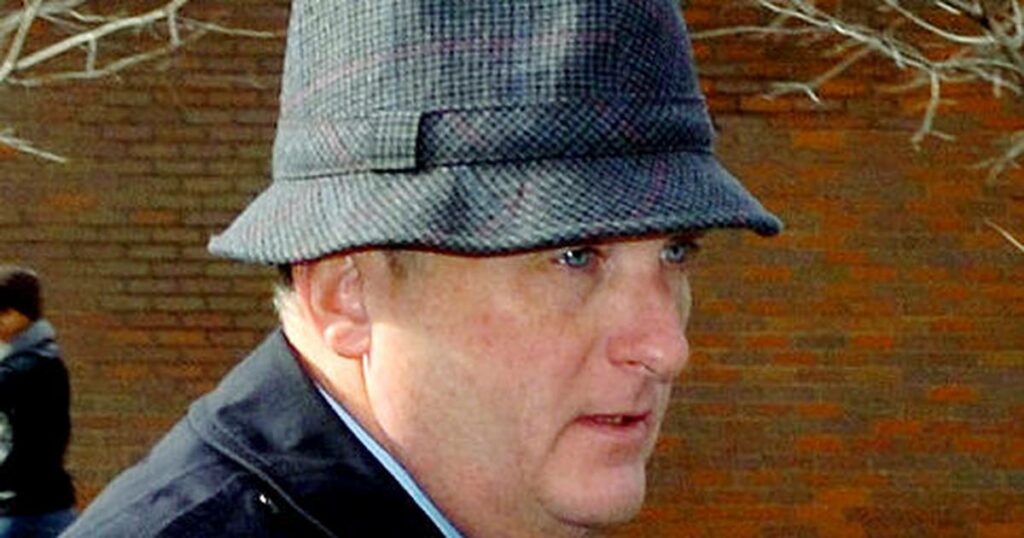
“I hate to disappoint so many of you,” Bharara joked. What he did say was this: “There is no prosecutor’s office in the state that takes more seriously the responsibility to root out public corruption in Albany and anywhere else that we might find it, and I think our record speaks for itself.”
Bharara ticked off some of the better-known names:
Assembly Member Brian McLaughlin, Assembly Member Anthony Semenerio, State Sen. Efrain Gonzalez. A fuller list was provided on a helpful hand-out of the biggest public corruption cases his office has made since he took over the top job last spring. In roughly chronological order: Council Member Miguel Martinez, Council Member Kendall Stewart’s chief of staff, four city Department of Education employees, a former police sergeant and two separate police officers, Bernie Kerik, a group of Administration of Children’s Services employees, the COO of NYC-TV and Assembly Member Carmen Arroyo’s chief of staff and that does not even include Larry Seabrook or Hiram Monserrate, two men long suspected of criminal activity who have recently been the subjects of their own press conferences with Bharara’s tight-lipped rundowns of the charges and presentations of facts, also handily sketched out in blue-and-red blow-ups.
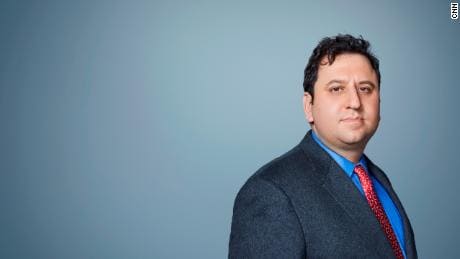
As things stand in New York, the attorney general has very little power to prosecute public corruption. Though Eric Schneiderman was among the candidates who campaigned on getting the governor to sign over more via executive order, he appears to have deferred for now to Andrew Cuomo, who has been cool to the idea. Instead, the governor-elect wants to weave new prosecutorial powers into an ethics reform package, but he acknowledges the inherent difficulties of getting the Legislature on board. The district attorneys around the state can make some cases, but not as many as they would like, and the bill Schneiderman sponsored with the heavy support of Manhattan DA Cy Vance disappeared into oblivion almost as soon as it was announced in May. Perhaps not coincidentally for a city and state with such a rich history of graft, local laws provide very little room for a prosecutor to move.
The U.S. Attorney does not have any of those problems. Locally focused, but nominated by the president and empowered by federal law, Bharara, who is now just past the one-year anniversary of his installation in the job, has a lot of options and a lot of laws. Even something in the arsenal so basic as the special penalty for lying to a federal employee can change the game.
An hour after Bharara walked out of the room in White Plains, his office sent out a release announcing charges against a Brooklyn man who had been selling counterfeit glasses on the Web. That evening, the office announced a 97-month sentence for a New Jersey man who had capped off a 20-year fraud career with a workat-home scheme that ripped a million dollars off from people around the country.
Just another day for the man who is probably the most powerful, almost entirely unknown government official in New York.
“I never say I have too much work,” Bharara said, “I say I never have enough time.”
The Southern District runs from Manhattan up through the Bronx, into Westchester, and then Dutchess, Orange, Putnam, Rockland and Sullivan counties. Most of the world’s money flows through it at some point, in some form. Outside of Tel Aviv or London, there is no collection of square miles as full of terrorist targets and terrorist fears. And outside of Trenton or Cook County, there is no place that can compete for corruption.
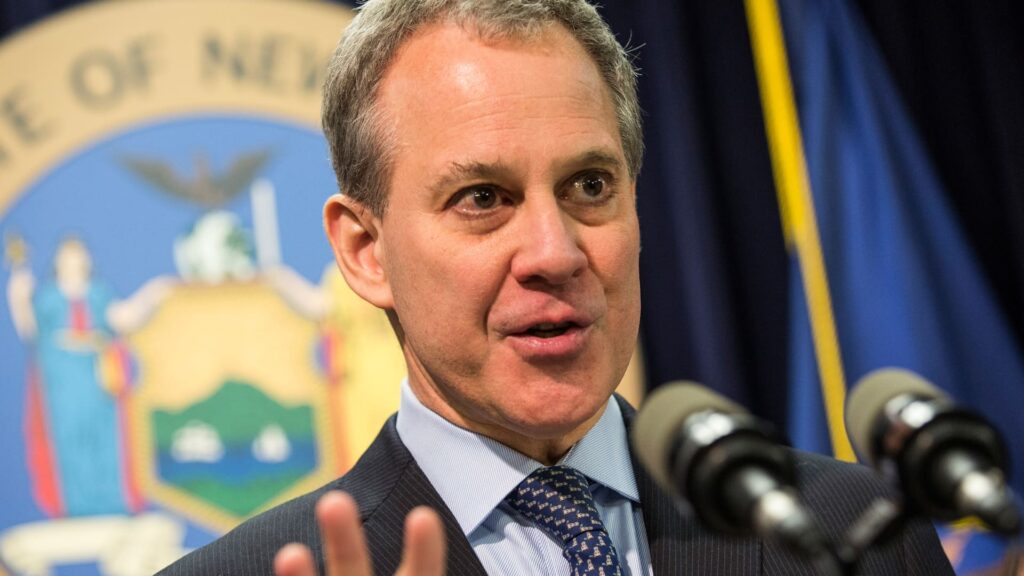
Bharara’s main office is at the Southern District’s southern edge, at 1 Saint Andrew’s Plaza, a short building distinct only for being non-descript government ugly. It is the only building on that street, tucked between the Municipal Building and One Police Plaza. Wall Street and the Financial District are close. Ground Zero is even closerfrom the right angle, the tops of the Twin Towers would have poked into view. And right across the street is City Hall, home of slush funds and politicians who have been investigated for how they ran their campaigns and are now investigated for how they are running their offices.
In other words, it is a neighborhood watch.
Preet Bharara has forged strong working relationships with many others in his jurisdiction, including Manhattan DA Cy Vance, whose office was a key partner in landing the biggest Medicaid fraud case in history.
Bharara spent a good chunk of his first year in the car, reemphasizing the office’s relationships with various agencies and district attorneys by visiting them in person. Organizationally, he has been overseeing a shift in office management, consolidating the international narcotics and terrorism units, while launching new units to address complex criminal and civil frauds. The Times Square bomber, who struck just short of a year after President Obama formally nominated Bharara for the job, occupied much of his summer. And there has been no shortage of other intricacies for him to delve into, from overseeing the first RICO prosecution of a vor (and learning what a vor, or the Armenian equivalent of a mafia boss, was) to deciding not to pursue charges in the Working Families Party investigation.
Bharara met one of his best friends, Viet Dinh, through a freshman dorm argument at Harvard over whether the people who wrote the Federalist Papers believed that men were inherently good or inherently evil. Dinh, who went on to be an assistant attorney general under George W. Bush and helped write the Patriot Act, thought evil. Bharara said no.
Twenty-five years later, Bharara is still honing his philosophy.
Now he is focused on institutions that betray people, going wrong and shaking their beliefs. The word “corruption,” he believes, is not just for government and politics, but for stockbrokers and traders and others in the financial world, too. The games and the size of the scores might be different, but the betrayal is fundamentally the same.
“While the elected politician who trades on his power to enrich himself undermines the integrity of our democracy and diminishes faith in our political system, the business professional who relies on his special skill to defraud others undermines the integrity of our economy and diminishes faith in our financial system,” Bharara said, laying out his philosophy in a speech in February.
The threads have begun to come together in recent weeks. Politicos in Westchester and Putnam are convinced that Leibell is the beginning, not the end, of a string of prosecutions and plea deals for local power players. Frenzied rumors are whipping around Wall Street of a coming insider-trading case, unlike anything seen before, that will portray traders, bankers, analysts and consultants feeding off each other and passing information around a nationwide network of reverberating returns. Speaking to the Bar Association in late October, Bharara laid out an argument that the line between street crime and white collar crime was getting blurry, that insider trading and other financial crimes were on the rise, while the volume of information mushrooming on the Internet was making the crimes increasingly difficult to track. But his speech came with a warning as well: the investigators and prosecutors were changing along with the criminals. Wiretaps were probably going to be used, as were undercovers, sources, stings and anything else they could justify” every legitimate tool should be at our disposal,” Bharara said.
“THERE IS NO PROSECUTOR’S OFFICE IN THE STATE THAT TAKES MORE SERIOUSLY THE RESPONSIBILITY TO ROOT OUT PUBLIC CORRUPTION IN ALBANY AND ANYWHERE ELSE THAT WE MIGHT FIND IT,” BHARARA SAID, “AND I THINK OUR RECORD SPEAKS FOR ITSELF.”
Leibell picked a random sidewalk in Carmel for his private conversation with the lawyer and ended up on videotape. The rest of the crooked politicians, staffers, bankers and traderstake note.
Cy Vance, whose jurisdiction overlaps with the prime areas in Bharara’s neighborhood watch, says he has had a productive working relationship with the U.S. Attorney’s office over the past year. The feelings are similarly warm from Cuomo’s office. But while Vance has been building up the bureaus in his office since taking over in January, and Cuomo has, as attorney general, been going as far as his mostly civil jurisdiction has allowed him in pursuing public and corporate corruption, Bharara has been racking up indictments, pleas and convictions.
During a slow moment just before Thanksgiving and the December rush of prosecutions began, Bharara sat down in his office to describe an approach that is animated by a sense of the public’s betrayal.
“People’s faith in various American institutions has been challenged, and I think that’s an unfortunate thing,” Bharara said.
Chasing inadvertent errors holds little appeal. He wants the principals, “not people who have come close to the line, but people who have galloped across it.”
“We are not about trying to figure out ways to criminalize things that are in a gray area. We are about creatively using the tools that we have and the resources we have to go after people who have clearly broken the law,” Bharara said. “We are, as a group, people who think outside the box, but within the constraints of the law. And I think that’s not a paradox.”
The Southern District office is older than the Department of Justice, home base for perhaps the longest-running collection of top legal talent in the country. Bob Morgenthau and Rudy Giuliani are the best known recent names to have run the place, but even the former assistants range from Felix Frankfurter to Charlie Rangel, Tom Dewey to Louis Freeh.
Bharara had his eye on the office for almost as long as he was interested in being a lawyer, tracing it to the class he took with Michael Mukasey–former AUSA, then a federal judge, and future Bush attorney general. Bharara’s is one of those stories that seems ripped from some kind of American dream promotional packet: his father, a Sikh, and his mother, a Hindu, were forced from what was then Pakistan to India after the countries were partitioned in 1947. They brought him to New Jersey as an infant, where he grew up a Bruce Springsteen fan (the only Boss he recognizes, Bharara says, to prove his independent prosecutor credentials), and then went to Harvard and then Columbia Law School. After graduating, he landed first in private practice at one of the city’s top firms before starting his public service career by being accepted to the U.S. Attorney’s office on his first try, was recruited to go work for Schumer on the Judiciary Committee and then nominated by Schumer to one of the most prestigious legal jobs in America, at just 40 years old. Along the way, he married a woman who is the daughter of an Indian Muslim father and a Jewish mother whose family landed in Palestine after fleeing the Nazis ahead of the Holocaust.
They have three children, who helped form what Bharara often describes as the Norman Rockwell-type scene from his installation ceremony: his father, never a crier, had tears streaming down his face, while his mother, always a crier, sat stoic. Meanwhile, his oldest son looked bored, his middle daughter was being tended to by his wife, and, without fail, the punch line: his youngest having his finger “so far up his nose I started to worry about brain damage.”
Bharara has a few choice lines like this–memorable, legitimately funny, conscientiously calibrated in wording and timing. He has one about stuffing his face with samosas while his wife fasts on Yom Kippur and his father-in-law fasts on Ramadan. He has one to describe the complex, technology-enabled financial fraud that his office investigates, about how the modern bank robber, the “cyber Willie Sutton,” needs only a mouse and a keyboard. And he even occasionally improvises, as when a reporter flipping through the materials at his announcement of a Medicaid fraud case that looped in 42 people and 118 clinics in 25 states, pocketing upwards of $100 million. The people had been hauled away to court, the evidence collected and fake medications locked in storage.
“In the indictment, there’s a mention of counterfeit Viagra,” the reporter said. “Does counterfeit Viagra work?” Bharara focused his surprisingly blue eyes, his mind working.
“No comment,” he said. His temple throbbed through the deadpan stare until a smile finally cracked.
“Want to come to our vault?” he said. Bharara, who sometimes gets talked about by fans as a potential U.S. attorney general prospect, is good at the public performance part of his job when he wants to be. At press conferences, there are always the prepared lines, the prepared blow-ups, the prepared wireless microphone clipped to his tie so he can step away from the podium to walk reporters through the bullet points of the prosecution. He wants to put the cases in a context to let people know what he and the other people getting paid out of tax money are doing with their days. Putting cases in context is important, he said, especially when that context has his staff pulling in about $570 million annually from its prosecutions, on a budget of $50 million.
“We’re doing better than most of corporate America in terms of return on investment,” he said.
Though Bharara is in constant conversation with other agencies and his AUSAs, and he is a boss who takes the time to put together a hand-written letter to every member of his staff who has a child, he is closely guarded, sometimes to the point of coming off stiff.
As the financial world waits anxiously for Bharara to move forward with the rumored insider-trading investigation, quiet advance criticism has been seeping out from people who worry that he might be on the verge of overreaching. To date, though there are a few scattered complaints of occasional grandstanding, even the people who might have reason to criticize steer clear of calling him out either because they do not have any complaints, or because they know how extensive his office’s reach can be.
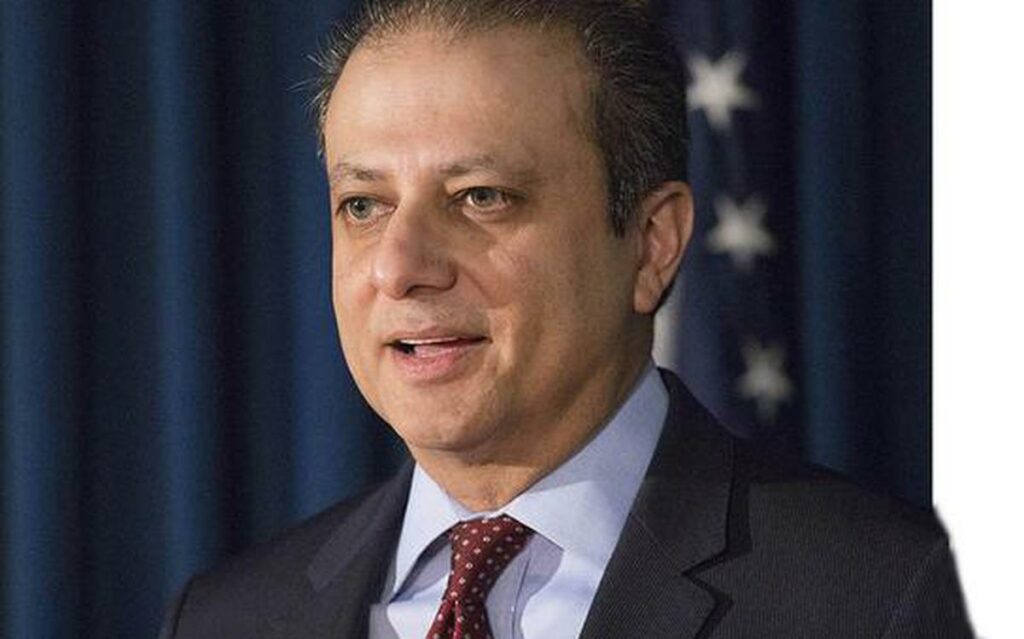
Murray Richman, a defense lawyer from the Bronx now representing Larry Seabrook against the $177 bagel charges, has gone up against quite a few Southern District U.S. Attorneys in the last 50 years and seen his fair share of blind crusades. Bharara’s approach is one of the better ones, he said.
“I can’t argue with him,” Richman said.
“It’s rational. It’s reasonable.”
What makes Bharara bristle is any suggestion that the few weeks he spent volunteering as a driver for Mark Green’s 1993 public advocate campaign while studying for the bar tags him as political, or any suggestion that working as the chief counsel to Schumer, the uber politician, on the Senate Judiciary Committee when he was investigating the Bush administration’s U.S. Attorney scandal, might have led to someone accusing him of bias.
“Can you name one of those people?” he responded in a clipped tone, cutting off the idea. “You can’t.”
Bharara owes much of the respect and notoriety that positioned him for his current job to his work in Washington on that scandal. Over two years, he helped run an unprecedented inquiry into the unprecedented politicization of the Justice Department under George W. Bush with no shortage of potential pitfalls for Bharara. But he earned rave reviews from just about everyone involved, even though Schumer was already publicly calling for Attorney General Alberto Gonzalez to resign.
By the end of the investigation, Gonzalez was gone, and seven U.S. attorneys from around the country had been dismissed.
He rarely makes a speech without mentioning the scandal, and though he often alludes to how much the experience shaped his thinking, he always notes that he has yet to publicly explain how it did. Even when pressed, he wiggles around without saying anything too specific.
“It doesn’t inform my way of thinking in the sense that it’s making me do any thing different,” Bharara said. “It was a searing experience for a lot of people, and it called into question a lot of things and assumptions that people had which I thought at that time was unfortunate.”
Just as important, he believes, is listening to, but not being defined by, the public. More cases than most people would expect start with news reports or tips to their hotline (a lot of the calls are about who killed John F. Kennedy or where Jimmy Hoffa is buried, but some of them focus on a contractor or an agency the office was not aware of before), but prosecutors who try their cases with a media jury endanger the process as well, he said.
“If justice is going to be done, and is going to be seen to be done, you can’t worry about what other people who are not aware of the facts want to have happen,” Bharara said. “Independence does not only mean independence from the political branch, which it means first and foremost, but it means independence from the political winds, and it means independence from public pressure.”
This can be especially difficult when tackling public corruption. For example, by the time charges were brought against Hiram Monserrate in October for funneling cash to his 2006 State Senate campaign from a member item-funded non-profit, he had already dodged conviction for slashing his girlfriend in an incident he maintains was an accident, bolted the Democrats in the Senate coup, been kicked out of the Senate by his colleagues, and then lost the special election for his old seat in the spring and his local Assembly seat in November.
“There’s always a tension between wanting to make sure you have identified every bad act, every bad bit of behavior, every bad actor in a criminal scheme, so that you are holding accountable to the fullest extent possible the people who are responsible for some criminal behavior,” Bharara said. “There’s no magic to that, other than thinking when the appropriate time is to strike.”
But especially with his history in Washington, the political corruption cases are the ones that resonate with Bharara most personally. At Saint Andrew’s Plaza, his office is at the far end of the eighth floor, next to his top deputy and close friend from the days when they worked at Gibson Dunn together, Boyd Johnson, who stayed at the office while Bharara went to D.C. and led the public corruption unit that took down Eliot Spitzer and the Em peror’s Club.
That unit is the only one located with them on the eighth floor, and both Bharara and Johnson spend a lot of time walking by, checking in, sitting down to get briefed on progress and suggest ideas.
“Preet gets very animated by these cases,” Johnson said. “There is little that he finds more galling than public corruption.”
Being a former Southern District AUSA makes Bharara a member of an informal fraternity that gave him the contacts in the Justice Department to move the firing scandal investigation forward, and it gives him an automatic relationship with other alumni now scattered across other agencies and defense firms. Then there are the personal relationships from working alongside others while an assistant in the officeJohnson, but also among them Richard Zabel who heads up the criminal division now overseeing the financial prosecutions; or Cuomo’s special assistant in the attorney general’s office, and soon to be the governor’s chief-ofstaff, Benjamin Lawsky; or City Commissioner of Investigations Rose Gill Hearn.
Gill Hearn has worked with five U.S. Attorneys since Mayor Michael Bloomberg hired her to run the city’s internal investigations department in 2002. Bharara’s appetite for moving cases that start with her office has been intense from the outset, and has actually been increasing over time.
Or, as she put it sitting in her office on the Friday after Thanksgiving, “I saw him twice this week, and it’s been a short week.”
There is not, after all, a shortage of opportunities to work together in trying to flush out government employees’ schemes and scams.
“We’re not the Maytag repairman,” Gill Hearn said. “There’s more than enough to do.”
Though he will not, of course, name names, nor drop hints, Bharara agrees. His message to people who think that, like Monserrate, enough time has passed since then that no one seems to have noticed, is simple: they might very well be wrong. Though he says he remains committed to walking away from cases that do not work, Bharara said the year ahead was going to be full of cases that will. That is true for all the things his office can touch, but especially for corruption.
“At the moment, business is not slow,” Bharara said. “And you can infer from that what you will.”

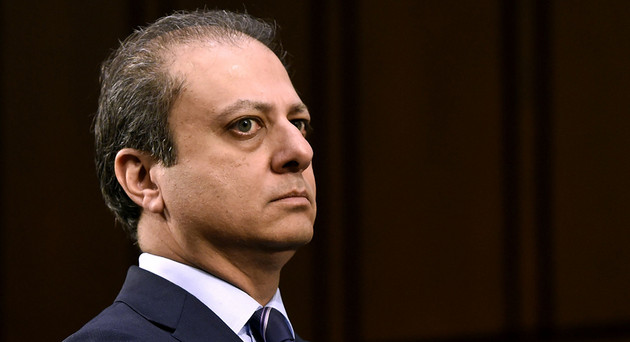
Average Rating